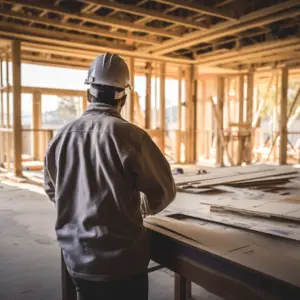Finding the perfect contractor for your project can be intimidating. But, with thorough thinking and research, it can be a breeze! Set your needs and tastes clearly. Figure out the scope of the job, what design or materials you want. It’ll help you communicate better with potential contractors, and they’ll get what you expect.
Ask advice from people you trust, like family or industry professionals. Word-of-mouth recommendations often provide valuable details on a contractor’s reliability. Also, use online platforms and review websites for opinions from previous clients.
Once you have a few contractors, ask for bids or estimates for your project. Go through these documents carefully to understand the costs, timelines, and any other terms or conditions. Compare objectively, keeping in mind things like experience, reputation, and portfolio.
Lastly, verify the contractor’s legitimacy. Make sure they have the proper licenses, insurance, and certifications required by local authorities or associations. This will protect you from any liability issues.
Table of Contents
Determine your project requirements

- Evaluate your needs.
- Assess what you want to accomplish in terms of functionality, aesthetics, and timeframe.
- Define the scope of work and outline tasks/deliverables.
- Set a budget.
- Research contractors who specialize in the type of work you need.
- Check references from previous clients.
- Communicate expectations, timelines, and any specific requirements.
- Discuss any unique challenges/constraints
- Don’t delay in determining project requirements.
- Spend time on this step.
- Choose the right contractor who can turn your vision into reality.
- Start today!
Research potential contractors
Researching potential contractors is a must when it comes to hiring professionals. It helps you gather info about skills, experience, and reputation.
To make research more organized, create a table with columns like:
| Contractor Name | Years of Experience | Specialization(s) | License/Certifications | Client Reviews | Pricing Range |
|---|---|---|---|---|---|
| Contractor 1 | 10 years | Electrical, Plumbing | Licensed Electrician, Certified Plumber | Positive | $1000 – $1500 |
| Contractor 2 | 5 years | Roofing | Roofing License | Mixed | $2000 – $2500 |
| Contractor 3 | 15 years | Painting, Flooring | Painting Certification, Flooring License | Positive | $500 – $1000 |
Fill the table with true and relevant data. Compare and evaluate different contractors.
Gather unique details not discussed earlier. These could include:
- The contractor’s availability
- Communication style
- Approach to handling unexpected challenges
An interesting historical account is the rise of online review platforms. In the past, homeowners had limited means of obtaining feedback about contractors. But now, websites and forums dedicated to customer reviews provide access to a wealth of info from previous clients. This development has transformed how people research and choose contractors.
Time invested in research will help find the right contractor who aligns with your vision and delivers quality results.
Evaluate contractor credentials and track record
It’s essential to look into a contractor’s credentials and history when selecting the right one for your project. Here are 3 major points to consider:
- Experience: Opt for contractors with plenty of experience in your particular type of project. This ensures they possess the required skills and know-how to tackle any potential issues.
- Qualifications: Assess their accreditations, such as licenses, certifications, and affiliations with professional bodies. These demonstrate their level of expertise and commitment to high-quality work.
- Track Record: Investigate the contractor’s previous projects and client reviews. Search for successful completions, satisfied clients, and good feedback about their professionalism, punctuality, and communication.
Also, evaluate if the contractor has any specializations or extra services that go well with your project specs.
A great example to show the significance of assessing a contractor’s track record is the story of a homeowner who remodeled their kitchen. They went ahead without checking the contractor’s work beforehand. This turned out to be a mistake, as the contractor had a history of unfinished jobs and unhappy customers. The homeowner suffered from delays, shoddy workmanship, and extra expenses.
By scrutinizing contractor credentials and track record carefully, you can make an informed decision that will result in a successful project.
Request and compare multiple bids
Choosing a contractor is essential. Requesting and comparing multiple bids provides you with the data to make an informed decision. Here’s a guide on how to do it:
- Research potential contractors. Find reviews, testimonials and project examples.
- Reach out and provide details about your project: requirements, deadlines and budget.
- Compare bids systematically. Make a table or document. Note cost estimates, materials, timelines, warranties and extra services.
- Assess qualifications and experience. Look at certifications, licenses and years of practice.
- Schedule consultations with top contenders. Ask remaining questions and clarify doubts.
Remember, hiring the right contractor involves more than cost comparisons. Professionalism, reliability, communication skills, and workmanship quality matter too. Also, HomeAdvisor research shows that homeowners who get three or more quotes can save up to 10%. Requesting multiple bids saves money and ensures you get the best contractor.
Meet with potential contractors
Selecting the right contractor is vital. Meeting them helps you judge their abilities, experience, and attitude. Here are 6 tips to remember:
- Come with a list of queries and worries.
- Ask for references and check them out.
- See how they communicate and how quickly they respond.
- Talk about your budget and make sure they can work within it.
- Look at their past projects and ask to see samples.
- Follow your gut – if anything feels off, look elsewhere.
Plus, doing background research on potential contractors can give you extra info that may not come up during the meeting.
My friend was searching for someone to remodel her kitchen. After interviewing many candidates, she found the perfect match. He was so attentive, listening to her ideas and giving good advice. They connected instantly and the end result was even better than she’d hoped. Meeting contractors makes a huge difference in finding the right one.
Finalize the contract agreement
The finalizing of a contract agreement is essential when choosing a contractor. To have a successful process, you should do these four things:
- Explain what you need: Clearly state the project requirements, timeline, and budget to your contractor. This will help avoid any issues later.
- Read the agreement: Carefully look over the contract to make sure all agreed details are in it. Check for clauses like payment terms, warranties, and cancellation policies.
- Get legal help if needed: If you don’t understand some clauses or legal terms in the contract, get legal advice. A lawyer can explain your rights and duties prior to signing.
- Sign and keep copies: When you are happy with the contract, sign it with the contractor. Keep copies and give one to the contractor too.
Moreover, it is vital to remember that the finalizing of a contract agreement means you and the contractor trust each other. It creates a strong base for a successful working relationship.
Pro Tip: Maintain communication during the contracting process. This will guarantee a cooperative and clear partnership with the contractor.
Monitor the progress and communication throughout the project

It’s essential to be aware of the project’s progress and communication. To guarantee a successful project:
- Frequently connect with the contractor to ensure they’re progressing.
- Keep conversations open to address any worries or queries.
- Be aware of any changes or different directions from the initial plan.
- Write down all chats and agreements to have reference of what was discussed.
- Organize frequent updates to stay informed and be sure everyone is on the same page.
Monitoring closely progress and communication promotes transparency and responsibility. It helps detect any issues in the early stages, allowing for fast resolution and avoiding delays or miscommunication.
Moreover, by vigilantly monitoring progress, you can make sure all participants are meeting deadlines and sticking to the project specs. This oversight contributes to a successful outcome.
An interesting fact: A Harvard Business Review research shows that good communication can raise project success rates by up to 80%.
Conclusion
Choosing a contractor can feel overwhelming. But careful research and thought can lead to the perfect match for your project. Start by researching their qualifications and experience. Plus, check out their portfolio and ask for references.
Talk to potential contractors. This will give you a sense of their communication style and if they’ll listen to your needs. A contractor who takes your ideas on board is likely a better fit.
Also, be aware of pricing. Don’t just go with the cheapest option. Look for transparent pricing and a breakdown of costs.
Finally, check their availability. A good contractor probably has other projects, so make sure they have enough time for yours too. This will stop delays and extra costs.
Frequently Asked Questions
1. How do I choose the right contractor for my project?
Choosing the right contractor for your project involves careful evaluation and research. Start by checking their credentials, experience, and reputation. Look for online reviews and ask for references. Request multiple quotes and compare them while considering the quality of their past work. Make sure the contractor is licensed, insured, and offers a warranty for their services.
2. What should I ask a contractor before hiring them?
Before hiring a contractor, ask questions such as:
- How long have you been in the business?
- Do you have experience with similar projects?
- Who will be responsible for supervising the project?
- Can you provide references from past clients?
- What permits and licenses are required for the project?
- What is the estimated timeline and cost?
3. Is it important for a contractor to be licensed and insured?
Yes, it is crucial for a contractor to be licensed and insured. A license ensures that they have the necessary qualifications and skills to perform the work. Insurance protects you from liability in case of accidents or damages during the project. Verify their license and insurance details before hiring.
4. How can I check a contractor’s reputation?
Checking a contractor’s reputation is an important step. Start by looking for online reviews on reputable platforms like Google, Yelp, or Angie’s List. You can also ask the contractor for references from their past clients. Reach out to these references and inquire about their experience, professionalism, and the quality of their work.
5. Should I get multiple quotes from different contractors?
Yes, it is advisable to get multiple quotes from different contractors. This allows you to compare prices, services offered, and the overall value you will receive. However, keep in mind that the lowest quote may not always be the best choice. Consider the contractor’s reputation, experience, and the quality of their work before making a decision.
6. What should be included in a contract with the contractor?
A contract with the contractor should include:
- Details of the project, including specifications and timeline
- Cost breakdown, payment schedule, and any applicable warranties
- Materials used and who will supply them
- Terms for dispute resolution or contract termination
- Insurance and liability information